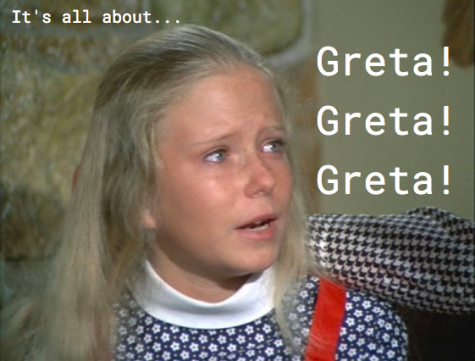Fridays for Future: Greta Thunberg’s Mission to Postpone Climate Change
October 4, 2019
Donning her signature plaits and rosy cheeks, 16-year-old climate activist Greta Thunberg adorns the cover of every mass news publication.

(Photo Credit: Chloe Mintz/ Achona Online/ Piktochart)
Having delivered her authoritative yet poignant speech at the United Nations Climate Action Summit, government officials and the public alike have been unable to get enough of Thunberg. What began as a solo school strike, Thunberg’s #Fridaysforfuture has amassed a following of almost four million citizens globally.
Of course, what is a global movement without a bit of controversy? In an article published by British tabloid The Sun, former “Top Gear” host, Jeremy Clarkson said, “Many thousands of people who you [Thunberg] had the temerity to blame this week are trying to do exactly what you want. So be a good girl, shut up and let them get on with it.”
“While I understand why some are hesitant to listen to a teeenager about issues in the world, I think Greta should be taken seriously. I don’t think the criticism she got was deserved, she was simply sharing her ideology and opinions on an important topic,” said Christiana Carotenuto (‘22).
Clarkson is not the only adult to express resentment towards the teenage activist. Both Michael Knowles of the “Daily Wire” and President Donald Trump have released disparaging comments mocking Thunberg’s stern demeanor and self-diagnosed Aspergers characterizing Thunberg as an inexperienced and juvenile adolescent. Such criticism has begged the question: are adults unwilling to believe children merely because of their age as opposed to their claims?
“Young people are compassionate and want to make a difference. This is threatening to some people, including adults. People (again, often adults) are also resistant to ideas that require change and possible sacrifice. I believe people who are in the public eye are open themselves to criticism–and their views should be investigated and challenged if not supported by credible sources–but it depends on what or who is being criticized. Are you challenging the person’s ideas, or are you attacking the person (as in an ad hominem argument)?” said English teacher Alison Jussaume.
In an effort to make light of the situation, Thunberg has flippantly alluded to the backlash either through direct commentary or her social media accounts. On Thursday, her Twitter bio read, “A kind but poorly informed teenager.”
Despite the ever-present media, Thunberg has no intention of ceasing her campaign— proving to be a role model for not only children on the spectrum but adolescents across the globe.
Over 4 million on #ClimateStrike today. In 163 countries. And counting…
If you belong to the small number of people who feel threatened by us, then we we have some very bad news for you:
This is just the beginning. Change is coming – like it or not. #FridaysForFuture pic.twitter.com/MHGRNx1tnH— Greta Thunberg (@GretaThunberg) September 21, 2019
“Thunberg has inspired me because she’s really young, and I’m really young, so it’s kind of inspired me and showed me that young people can make a difference as well and that’s really cool,” said Amelia Vitello (’23).
While one’s ability to be self-expressive has been limited at one time or another, the Academy community has ensured each students’ opinions are both shared and respected.
“One of the reasons that I enjoy working with young adults is that they are open to new ideas. They also tend to have a laser-focus on issues concerning justice, which is not always the same for adults,” says Jussaume.


Bella Hifko • Oct 15, 2019 at 3:13 pm
I thought it was really cool how the writer of the article included a fellow classmate opinion, It’s nice to know and hear what others think about topics. In addition, I thought the writer did an excellent job on the article, it was well written. I had heard about Greta on instagram, and I absolutely love that she is a teenager advocate for climate change.